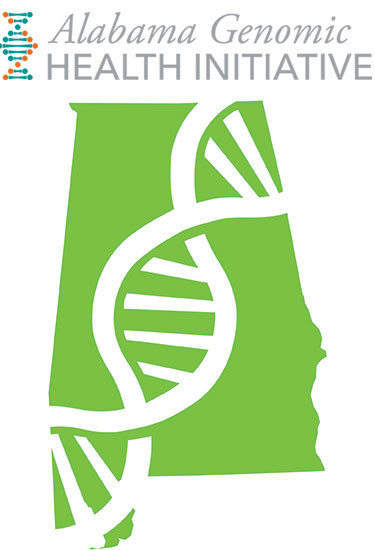 Full scale recruitment for the Alabama Genomic Health Initiative has begun at University of Alabama at Birmingham clinics in Birmingham. The AGHI is one of the nation’s first statewide efforts to harness the power of genomic analysis to identify those at high risk for genetic disease.
Full scale recruitment for the Alabama Genomic Health Initiative has begun at University of Alabama at Birmingham clinics in Birmingham. The AGHI is one of the nation’s first statewide efforts to harness the power of genomic analysis to identify those at high risk for genetic disease.
The AGHI, a partnership between UAB and HudsonAlpha Institute for Biotechnology, was announced on March 9. It will recruit a diverse group of participants from every county in Alabama and provide genomic analysis and interpretation to this group free of charge.
Following the conclusion in May of a pilot project that recruited the first 100 participants, the AGHI has now opened widespread recruitment with the intent of adding 2,000 individuals in the first year. Over a five-year period, the goal will be to increase the number of participants to more than 10,000 persons.
“This project will result in immediate health benefits to some participants, and in the long term will help to address problems of chronic disease and rising health care costs in the state,” said Bruce Korf, M.D., Ph.D., chair of the UAB Department of Genetics and co-director of the AGHI. “It will also position Alabama as a leader at the forefront of 21st century medicine.”
“The AGHI could lead to identification of new genetic diseases and new treatments that will benefit Alabamians and the rest of the world,” said Greg Barsh, Ph.D., faculty investigator at HudsonAlpha and co-director of the AGHI. “Researchers working on finding cures to conditions like diabetes, heart disease, epilepsy and cancer will be able to utilize knowledge from these data to identify genetic factors that predispose people to these diseases as well as rare disorders—all with the ultimate goal of developing new approaches to prevention, diagnosis and treatment.”
| Recruitment is now open at UAB Kirklin Clinic and Medical Towers in Birmingham. The process takes about 30 minutes. Participants will have an opportunity to learn more about AGHI by interacting with patient navigators. The navigators will explain the benefits and responsibilities of participation in AGHI, and if they choose, participants can join at that time. A simple blood draw will be done to obtain DNA. |
Recruitment is now open at UAB Kirklin Clinic and Medical Towers in Birmingham. The process takes about 30 minutes. Participants will have an opportunity to learn more about AGHI by interacting with patient navigators. The navigators will explain the benefits and responsibilities of participation in AGHI, and if they choose, participants can join at that time. A simple blood draw will be done to obtain DNA.
Organizers used the pilot phase recruitment of the first 100 participants to refine the recruiting process to be sure that materials are understandable and effective.
“We wanted to evaluate our informed consent procedures and educational materials to be sure they are clear and accurately communicate the goals and objectives of the AGHI,” said Mona Fouad, M.D., director of the UAB Division of Preventive Medicine and co-chair of the AGHI recruitment working group. “We have incorporated lessons learned during this period and are ready to begin reaching out to a wide cross-section of Alabamians.”
The majority of participants in the initiative will undergo a genotyping array test, assessing some 650,000 identified genomic biomarkers. The genotyping test will look for the presence of variants in 59 specific genes, referred to as actionable genes by the American College of Medical Genetics and Genomics. The 59 genes are those that are known to contribute to disease and for which the potential for prevention or treatment exists. They include genes such as BRCA1 and BRCA2, which are associated with a genetic risk of breast and ovarian cancer. It is expected that this list will change over time, as new genes are recognized that can lead to improvements in medical care for an individual being tested.
Participants who test positive for one of the 59 genes on the ACMG list may consent to receive that information through genetic counseling and can consent to have it shared with their primary medical provider. Referral to appropriate prevention strategies or treatment will be provided both to participant and through the primary care physician or a specialized provider.
Participants with signs of a genetic condition of undetermined origin will receive a more extensive evaluation, known as whole genome sequencing. Analysis and interpretation of those results will also be communicated to patient/parents and his or her primary medical provider, and participants will be linked to appropriate medical care.
All of the genetic information of consenting participants will be saved in a database for research use utilizing the combined resources of the UAB-HudsonAlpha Center for Genomic Medicine, UAB Informatics Institute and the Hugh Kaul Personalized Medicine Institute.
“Protecting the privacy of our participants and safeguarding the personal information gathered is a priority for the AGHI,” said Matt Might, Ph.D., director of the Hugh Kaul Personalized Medicine Institute and co-director of the AGHI. “In addition to rigorous systems to ensure privacy, the AGHI bioethics team — with ethicists from HudsonAlpha, Tuskegee University and UAB — will review all plans and procedures to ensure that appropriate safeguards and protections are in place.”
Additional recruitment sites around the state will be added as the initiative progresses.
To learn more about the Alabama Genomic Health Initiative please visit www.aghi.org. To participate, call 1-855-462-6850.